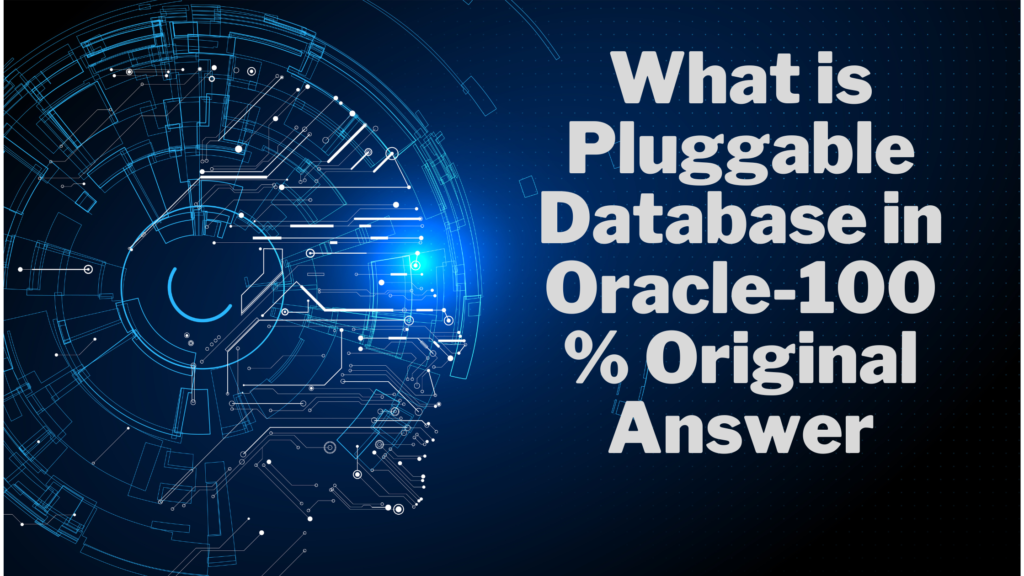
In the dynamic realm of database management, the concept of pluggable databases, often referred to as “What is Pluggable Database in Oracle-100% Original Answer,” has emerged as a transformative innovation. Oracle, a leading name in the database industry, introduced pluggable databases as part of its multitenant architecture. This revolutionary approach has redefined how organizations structure and manage their databases.
Introduction to Pluggable Databases in Oracle
Pluggable databases, often referred to as PDBs, are essentially a compartmentalized way of organizing and managing data within a single Oracle container database (CDB). Unlike traditional non-pluggable databases, CDBs can hold multiple PDBs, which makes them incredibly versatile.
Advantages of Pluggable Databases
Scalability and Resource Utilization
One of the key benefits of pluggable databases is scalability. Organizations can add or remove PDBs according to their evolving data needs, efficiently utilizing resources.
Simplified Database Management
PDBs streamline database administration, as you can manage multiple databases simultaneously within a single CDB. This simplifies the task of maintaining the database.
Cost-Effectiveness
By sharing system resources and infrastructure, pluggable databases offer cost savings, as fewer servers are required to handle multiple PDBs.
Creating Pluggable Databases
Creating a PDB in Oracle involves a few straightforward steps. You can start by connecting to the CDB and then executing SQL commands to create the PDB, specifying its characteristics.
Managing Pluggable Databases
Managing PDBs is an essential skill for database administrators. This includes tasks such as starting and stopping PDBs, monitoring performance, and implementing security measures.
Use Cases for Pluggable Databases
Pluggable databases are valuable in scenarios where isolation and resource allocation are critical. For example, in a cloud environment, PDBs can be allocated to different customers, ensuring data segregation.
Limitations of Pluggable Databases
While PDBs offer numerous advantages, they do come with limitations, such as increased resource consumption and complex configurations in certain cases.
Migration to Pluggable Databases
For organizations considering the shift to pluggable databases, a smooth migration process is crucial. Data migration and application compatibility are key areas to focus on.
Security Considerations
Security should always be a priority. Implementing encryption, access controls, and auditing in PDBs is essential to protect sensitive data.
Backup and Recovery
Data protection is a fundamental aspect of database management. Regular backups and well-defined recovery procedures are vital for safeguarding data.
Performance Optimization
To ensure optimal performance, database administrators need to fine-tune PDBs by monitoring resource utilization and making necessary adjustments.
Oracle’s Support for Pluggable Databases
Oracle remains committed to enhancing pluggable database technology, ensuring it remains a viable option for businesses.
Industry Adoption
Numerous organizations across different industries have embraced pluggable databases, recognizing their potential for efficiency and scalability.
Comparing Pluggable Databases and Non-Pluggable Databases
It’s essential to compare the benefits of pluggable databases with traditional non-pluggable databases to determine the right approach for your organization.
Future Trends
The landscape of pluggable databases is constantly evolving, with new features and enhancements on the horizon.
Conclusion (What is Pluggable Database in Oracle-100% Original Answer)
In conclusion, pluggable databases in Oracle represent a significant shift in the world of database management. Their scalability, cost-effectiveness, and streamlined administration make them a compelling choice for businesses of all sizes. While there are limitations and challenges, Oracle’s commitment to innovation ensures that pluggable databases will remain a relevant and powerful solution.
FAQs
1. Are pluggable databases suitable for small businesses?
Pluggable databases can benefit businesses of all sizes. They offer scalability and cost-effectiveness, making them a viable option for small businesses.
2. How do pluggable databases affect data security?
Pluggable databases require careful security measures, including encryption and access controls, to protect data within each compartment.
3. Can I migrate my existing database to a pluggable database architecture?
Yes, it is possible to migrate existing databases to a pluggable database architecture with proper planning and execution.
4. What is the main difference between pluggable databases and traditional non-pluggable databases?
The primary difference is that pluggable databases allow you to manage multiple databases within a single container database, providing enhanced resource utilization and scalability.
5. What does the future hold for pluggable databases in Oracle?
The future of pluggable databases is bright, with ongoing development and enhancements to meet the evolving needs of businesses.
